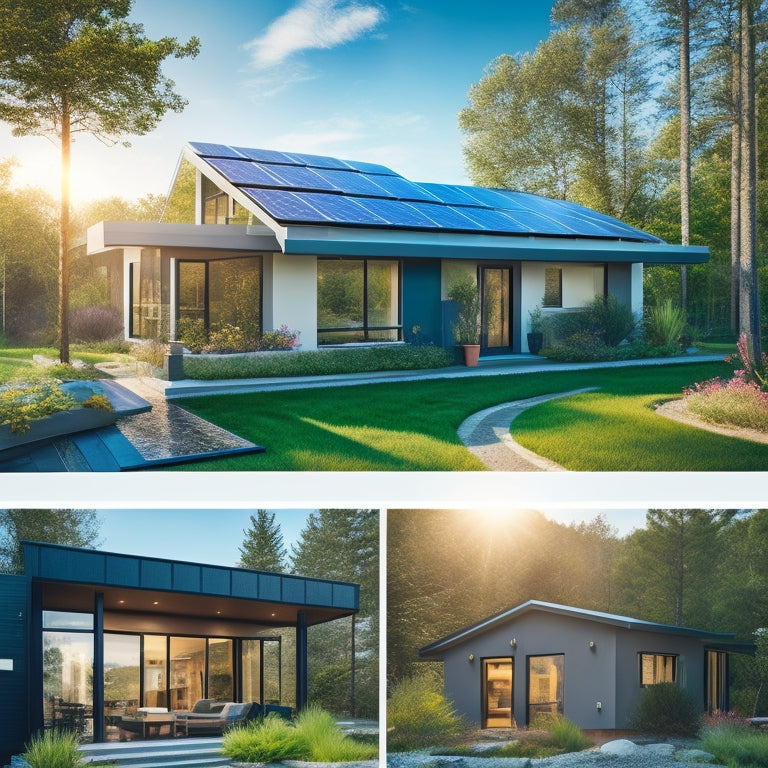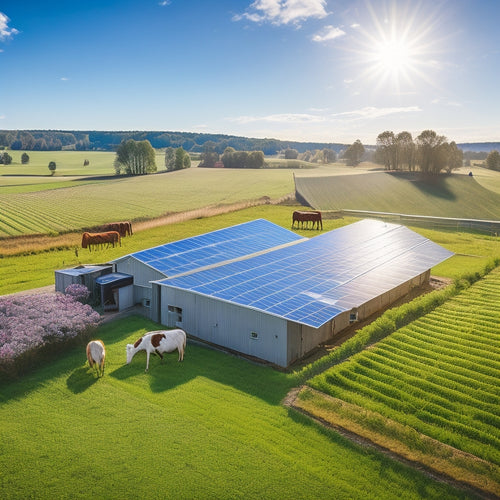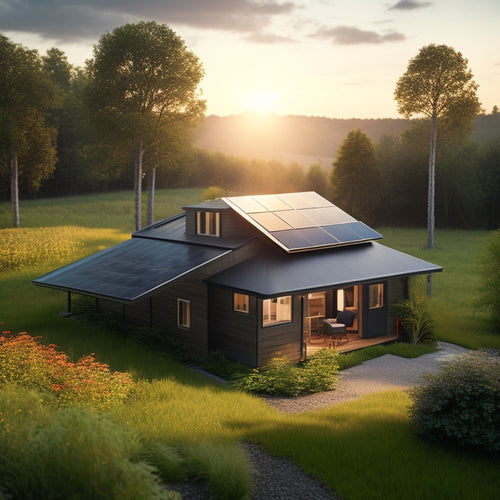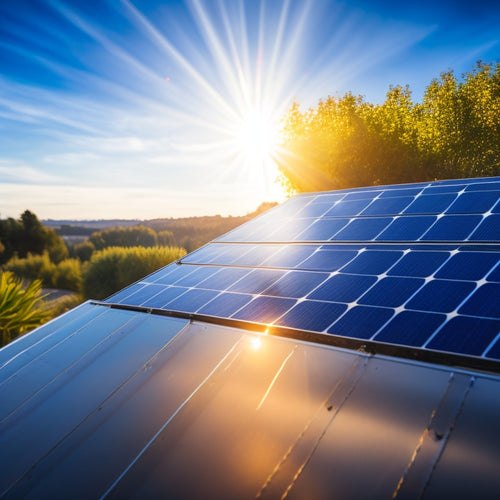
Unlock Higher Efficiency for Home Energy Systems
Share
You can open up higher efficiency for your home energy system by optimizing its various components, such as solar panels, inverters, and energy storage solutions, which can lead to a significant increase in energy harvesting capacity and reduction in grid dependency. By understanding the subtleties of solar panel efficiency, you can make informed decisions about installation techniques, inverter performance, and environmental impact. By implementing smart technologies, advanced energy storage, and real-time monitoring, you can maximize your energy yield and reduce costs. Now, uncover the specific strategies and techniques that can take your home energy system to the next level.
Overview
- Optimize solar panel installation with proper angle, direction, and racking systems to maximize energy output and reduce losses.
- Implement advanced energy storage solutions and smart technology to enhance energy harvesting capacity and reduce grid dependency.
- Conduct regular cleaning and maintenance of energy-efficient systems to ensure peak performance and extend their lifespan.
- Utilize data analytics and real-time monitoring to track energy usage, identify areas for improvement, and make data-driven decisions.
- Invest in high-efficiency solar panels with a minimum 25-year warranty to reduce energy losses and increase independence from traditional sources.
Understanding Solar Panel Efficiency
Your expedition to utilizing the power of the sun begins with understanding solar panel efficiency.
As you explore the world of solar technology, it's vital to grasp how energy conversion occurs. Solar panels convert sunlight into electrical energy, with efficiency metrics measured by their ability to do so. High-efficiency silicon solar cells, for instance, achieve conversion rates over 26%, making them suitable for off-grid systems bifacial solar panels.
A panel's lifespan, typically 25-30 years, greatly affects its overall efficiency. Proper installation techniques and inverter performance also play an important role.
When evaluating solar panels, consider the environmental impact and cost analysis. By understanding these factors, you'll be better equipped to make informed decisions about your energy system, ultimately achieving greater freedom from traditional energy sources.
Boosting Energy Harvesting Capacity
As you enhance your solar panel system, focusing on energy conversion efficiency is just the beginning. To truly elevate energy harvesting capacity, you need to integrate innovative materials and smart technology that enhance system performance.
This includes advanced energy storage solutions that maximize energy capture and reduce grid dependency, such as those made possible by economies of scale in production, which reduce costs by 15% to 20% with each doubling of capacity.
Additionally, advancements in battery technology, like solid-state and nanotech, lower costs and enhance efficiency. By incorporating sustainable practices and performance analytics, you can fine-tune your system to achieve ideal energy management.
Seamless system integration and grid connectivity enable real-time monitoring and adjustments, ensuring maximum energy yield. By leveraging these technologies, you'll access higher energy harvesting capacity, leading to a more independent and efficient home energy system.
Optimizing Panel Angle and Placement
Solar panels are only as effective as their positioning allows. You need to take into account panel orientation and installation techniques to maximize energy output.
It's crucial to choose high-efficiency solar panels with a minimum 25-year warranty, as they'll provide reliable energy production and reduce maintenance costs high-quality panels.
The ideal angle for your solar panels depends on your location's latitude and the time of year. Generally, a tilt between 30 and 40 degrees is most effective. You should also verify your panels face the correct direction, typically south in the northern hemisphere.
When installing, take into account the roof's pitch and obstacles like vents or skylights. Proper installation techniques, such as using adjustable racking systems, can help you achieve the perfect angle.
Reducing Shading and Reflection Loss
Shading and reflection losses can considerably diminish the energy output of your solar panel system. To mitigate these losses, you'll need to conduct a shading analysis to identify potential obstructions, such as nearby buildings, trees, or roof features.
This analysis will help you determine the best placement and configuration for your solar panels. Additionally, implementing reflection mitigation strategies, like using anti-reflective coatings or tilting your panels, can also help reduce energy losses.
Cleaning and Maintenance Essentials
You'll want to establish a routine for cleaning and maintaining your home's energy-efficient systems to guarantee they continue to perform at peak levels.
This involves daily filter cleaning to prevent dust buildup, as well as regular coil maintenance to keep your HVAC system running smoothly.
Daily Filter Cleaning
Daily filter cleaning is an essential aspect of maintaining your home's energy efficiency. As you know, dirty filters can increase energy consumption, reduce airflow, and even damage your HVAC system.
You'll need to clean or replace filters regularly, depending on the type. For example, fiberglass filters require monthly replacements, while pleated filters can be cleaned every 3-6 months.
Invest in a good quality filter cleaning tool, such as a soft-bristled brush or a vacuum cleaner with a gentle suction setting. Gently remove dirt and debris from the filter, taking care not to damage the delicate fibers.
Coil Maintenance Tips
By keeping your filters clean, you've taken a significant step in maintaining your home's energy efficiency.
Now, it's time to focus on your coils. Dirty coils can reduce your system's efficiency by up to 30%, so regular cleaning is vital. Use gentle coil cleaning techniques, such as brushing or vacuuming, to remove dirt and debris. Avoid using harsh chemicals or high-pressure washes, which can damage your coils.
Additionally, keep an eye on your coil replacement frequency. Typically, coils should be replaced every 10-15 years. However, this may vary depending on usage and environmental factors.
Schedule Regular Checks
In addition to cleaning your coils, scheduling regular checks is essential to maintaining your home's energy efficiency. By doing so, you'll identify potential issues before they escalate, reducing energy usage and the need for costly system upgrades. Regular checks also help you stay on top of wear and tear, ensuring your system runs smoothly and efficiently.
| Task | Frequency |
|---|---|
| Air filter replacements | Every 1-3 months |
| Ductwork inspections | Every 6-12 months |
| Thermostat calibration | Every 12 months |
| HVAC system tune-ups | Every 12-24 months |
| Energy audits | Every 2-5 years |
Monitoring Performance for Improvement
Track your energy usage to pinpoint areas that need improvement. Monitoring your home energy system's performance is essential to optimize its efficiency.
By leveraging data analytics, you can identify patterns and trends in your energy consumption. This allows you to set performance benchmarks and track your progress over time.
You'll be able to detect anomalies, diagnose issues, and make data-driven decisions to improve your system's performance. With real-time monitoring, you can adjust your energy usage habits, optimize your system's settings, and reveal higher efficiency.
Frequently Asked Questions
Can I Use Solar Panels With My Existing Electrical System?
You can integrate solar panels with your existing electrical system, but first, you'll need to verify compatibility by checking your system's voltage, current, and power ratings to confirm a seamless solar panel integration without compromising your existing setup.
Are Energy-Efficient Appliances Compatible With Solar Energy?
"An ounce of prevention is worth a pound of cure." You'll be pleased to know that energy-efficient appliances are not only compatible with solar energy, but they also maximize energy savings and extend appliance lifespan, giving you more freedom from utility bills.
Can I Install Solar Panels on a Metal Roof?
You can install solar panels on a metal roof, leveraging its advantages like durability and water resistance. However, consider factors like panel attachment methods, roof slope, and structural integrity to guarantee a secure and efficient installation.
Do Solar Panels Work During Power Outages?
"When in doubt, shine a light," and with solar panels, you're probably wondering if they work during power outages. You'll need solar battery storage to keep the lights on; grid-tied systems won't cut it, as they're designed to sync with the grid, not provide backup power.
Can I Expand My Solar Panel System in the Future?
You can easily expand your solar panel system in the future as your energy needs grow, simply by adding more panels or upgrading your inverter to accommodate increased power output, ensuring you're prepared to meet your future energy needs.
Ready to Buy
By implementing these strategies, you've taken a significant step towards unblocking higher efficiency for your home energy system. Did you know that the average American household can save up to $400 annually by optimizing their solar panel performance? By putting these tips into practice, you'll not only reduce your carbon footprint but also enjoy substantial savings on your energy bills. Now, it's time to reap the rewards of your efforts and enjoy a more sustainable, cost-effective energy future.
Related Posts
-

What Do I Need to Know About Farm Solar Panels
When considering farm solar panels, you need to assess costs, benefits, and technical specifics. Initial investment c...
-

Diy Off Grid Solar
By embracing DIY off-grid solar, you can break free from grid dependence, slashing your energy bills by up to 90% and...
-

How Efficient Are Thin Film Solar Cells
Thin film solar cells provide an innovative approach to energy generation, boasting efficiency rates generally betwee...


